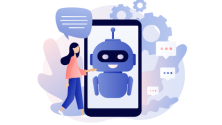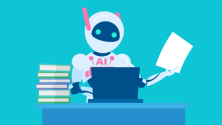How is artificial intelligence changing the world? Will it replace half your employees? What about your job?
Earlier this year at the MIT Sloan CIO Symposium, automation experts Andrew McAfee and Erik Brynjolfsson, co-authors of “The Second Machine Age: Work, Progress, and Prosperity in a Time of Brilliant Technologies,” declared that if anything, we have "underestimated" automation’s likely effects on the workforce. An explosion of data is fueling rapid advances in machine learning, Brynjolfsson notes. As a result, jobs involving pattern matching, such as pathologists, may experience severe disruption, he says. So will jobs involving physical labor, such as truck driving.
However, tasks that demand creativity, multi-step planning, and making interpersonal connections (such as coaching), remain hard for machines to do, Brynjolfsson notes. “There is no shortage of jobs only humans can do,” he says.
Looking beyond jobs, how will AI change what your business can do – in record time? Few question that AI will provide greater insights into your organization. At the other end of the spectrum, should you worry that AI will ultimately overtake its human creators as Elon Musk and Stephen Hawking have suggested?
If you want to understand more about the power and potential of AI and machine learning, a great place to start is with TED Talks. Many TED speakers have explored the question of AI and its potential to change our lives in thought-provoking and entertaining ways. These talks will get you thinking about AI in a whole new way:
1. Can a robot pass a university entrance exam?
AI expert Noriko Arai and her team have created Todai Robot, whose sole purpose is to pass the entrance exam for the University of Tokyo, the most prestigious university in Japan. So far it hasn’t succeeded in getting in, even though it scores better than 80 percent of its human competitors. That is impressive when you consider that, while the robot can do searches and make pretty smart inferences from what it finds, it can’t actually read.
2. The era of blind faith in big data must end
Data scientist Cathy O’Neil challenges the common assumption that because algorithms are mathematical, they are also objective. The people who create algorithms decide which data matters and which should be ignored, she explains. And they also define success which most often means simply reproducing what a human would have done. As a result, she says, “They don’t make things fair. They repeat our past practices, our patterns. They automate the status quo.”
3. Machine intelligence makes human morals more important
Writer and academic Zeynep Tufekci knows machine learning first-hand, from his previous work s a programmer. Powerful as machine learning is, it also presents some difficult ethical challenges because it’s a black box. AI is now used for everything from predicting which criminals are likelier to re-offend (and thus should get longer sentences) to whom companies should hire. In machine learning, AI teaches itself how to make decisions, which means that the humans who created it may not know how those decisions are being made.
4. Can we build AI without losing control over it?
Neuroscientist and philosopher Sam Harris breaks down the question of why we need to worry about AI, using some simple logical steps. As long as nothing happens to prevent humanity from continuing to improve our machines, we will inevitably build some that are smarter than we are and are also capable of improving themselves, he argues. Once they can do that, they are likely to grow smarter at an exponential rate. How long will it be until that happens? And what happens then?
5. Get ready for hybrid thinking
Futurist and inventor Ray Kurzweil has a decidedly rosier view of the future relations of human and artificial intelligence. Imagine a situation suddenly arises that requires all your smarts – and more. You’ll be able to vastly improve your intelligence for the few moments you need it by using nanobots in your brain to access that extra thinking power from the cloud, he says.
“Our thinking, then, will be a hybrid of biological and non-biological thinking, but the non-biological portion is subject to my law of accelerating returns. It will grow exponentially,” he says. When will all this goodness happen? In the 2030s, Kurzweil predicts. Stay tuned.
[ See our related article, 5 TED Talks on transformational leadership to watch. ]






